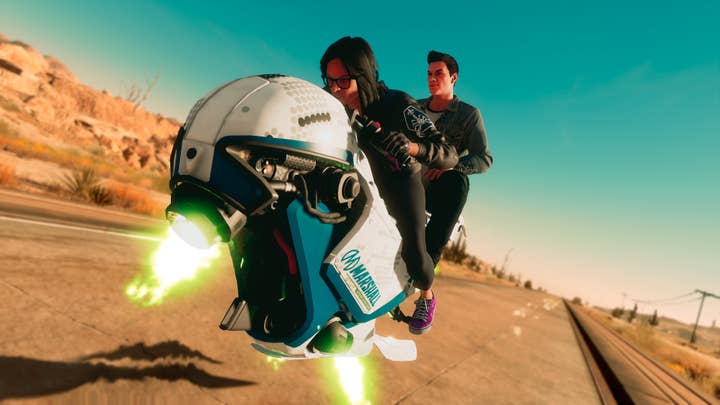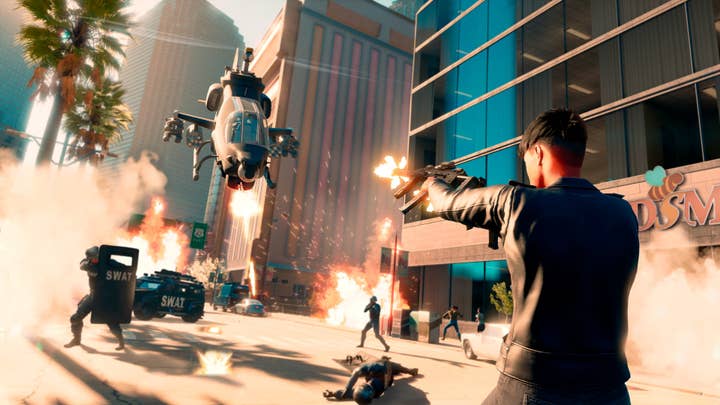Broadening Saints Row's humour to expand its audience
Volition's Brian Traficante and Rob Loftus on rebooting the open-world crime series and why the default Boss isn't yet another white guy
At first, Saints Row may have seemed like a Grand Theft Auto wannabe, hoping to tap into the huge success Rockstar had seen with the PS2 era trilogy. But as GTA 4 veered into grittier, more realistic territory, it became clear that Saints Row was heading in a very different direction.
By the end of the series, Saints Row fans had been given superpowers, massacred enemies to the epic sound of Bonnie Tyler's 'Holding out for a Hero,' thrown themselves in front of vehicles to claim on the insurance money, sprayed sewage over unsuspecting pedestrians, and wielded weaponry ranging from the dubstep gun to a fart in a jar – and, yes, those purple phallic melee weapons.
The rebooted Saints Row, which arrives on PC and consoles tomorrow, has a considerably different tone.
There will still be some over-the-top antics; there are jet bikes, one rival gang wears neon-lit cat helmets, and developer Volition has confirmed the return of Insurance Fraud. But overall, the game is more akin to a Hollywood action movie, with plenty of shootouts, car chases and stunts as players build a new Saints gang in Santo Ileso, a fictional city based loosely on Las Vegas.

The change in tone has divided opinion among fans, but principal producer Rob Loftus tells GamesIndustry.biz the shift was a "creative choice" by the studio, with the hope of appealing to a broader audience.
"It wasn't a choice where somebody on the publishing side, or somebody on the business side said, 'You know what? Societal tastes have changed and we need to change Saints Row,'" he says. "It was our own thinking that drove this.
"I think that a lot of content creators and brands are trying to expand their audience. And that means not connecting with that type of humour. It's about connecting with a type of humour that is more suitable for a larger audience. We all know that society's tastes can change over time. Saints Row 1, 2, 3 – they were games of their time, and with our approach here, it was about bringing Saints Row to a bigger audience and the audience of today."
If recent reports are to be believed, even Rockstar has altered its approach to humour in games with the next Grand Theft Auto designed not to "punch down" with jokes aimed at marginalised groups. With such groups and their allies much more likely and able to protest against this content in the age of social media, is there pressure or added scrutiny on developers that have historically used 'edgy' comedy to help their games stand out?
Franchise creative director Brian Traficante stressed that Volition was never issued "a checklist saying 'Do not do'," adding: "It was never, 'Avoid juvenile humour. Avoid potty jokes. Avoid sex.' It was more like, 'What have people connected with? Why did they connect with that weapon, or that joke, that story, that moment? And how do we get them to connect to what we're doing today?'
"It wasn't somebody on the business side who said, 'Societal tastes have changed and we need to change Saints Row.' It was our own thinking that drove this"
Rob Loftus, Volition
"It wasn't an agenda to replicate or go there, but it was very natural for us to, as developers, find that new approach towards the type of humour we wanted, or what's wacky in the game. It's about how we surprise the player. We give them that unexpected moment that you think you've figured it all out, and then all of a sudden, the game takes the zig on the zag. And that's the kind of conversations we would always have.
"As we continue to approach and look for that, what is that edge? It took shape in different kinds of themes, and different kinds of jokes, and different cleverness of how we surprise the player."
Traficante adds that the team always took care to ensure any comedy was not harmful – "That's been the ground rule for forever" – but notes that society and its tastes are not the only things that have changed since the series began. The studio is not the same as it was fifteen years ago, and the people have changed too, both through staff turnaround but also through personal growth.
There were two other factors behind the shift in Saints Row's attitude. One was Volition's need to recover from the disappointment of Agents of Mayhem, a 2017 spin-off that failed to wow critics or generate significant sales. Traficante still refers to that project as a "labour of love" but adds that not all games "finish where you want them to" and chooses to see it as a learning experience.
"There were all the normal things you would expect about lessons learned from development and choices, and coming back into something more familiar like Saints Row was really an advantage," he says. "It was an avoidance of all the things that we realised in the moments we recognised that that had impact on that project, and laying down better foundations of all the critical components of creative development and communication, and just really looking to avoid those kinds of pitfalls of overscoping."

Another critical element was how outlandish the series had become. From its 2006 origins as a game about gang warfare on the city streets, it escalated to the point where players had superpowers, went to outer space to fight aliens, become President of the United States and even journeyed into Hell. Short of "blowing up the universe," as Traficante says, it's hard to imagine what Saints Row 5 could have even looked like.
Loftus adds: "It seemed like a moment where we could just maybe take a step back and say, 'Well, now let's do something completely new. Maybe rethink those storylines. Do a new crew. Do a new cast of characters and play with it that way.'"
The new cast has enabled the studio to shake things up, with one very prominent example: the default Boss (the player's character) is a young Black woman.
"Coming back into something more familiar like Saints Row was really an advantage"
Brian Traficante, Volition
While Saints Row has always had a diverse cast across its series and an extensive character creator, it's still rare for any AAA title to present players with anyone other than Yet Another White Bloke as the face of the game.
"We felt it was time," says Loftus. "We really responded to that character, the look of that character. We, along with our publishing partners, rallied around that image. I remember the meeting where we all made the choice. At the time, it was a bold choice but we just felt it was right."
Traficante adds: "That was one of the earlier ones we did, and we fell in love with that character, and that character just embodied everything that a badass Boss and captain of the Saints crew should be."
Reviews for the new Saints Row went live today, with the first wave of critique ranging from middling to disappointed. Whether the game resonates well with players and sells in line with its predecessors, only time will tell.
As for the future, Volition has plenty of options. In the wake of Agents of Mayhem, it returned to Saints Row – by far its biggest hit. But Loftus doesn't rule out a return to other franchises, such as Red Faction. It's largely dependent on what sort of game the team wants to be.
"One of the great strengths of Volition is that we have shipped games in multiple genres to critical success: Red Faction, space simulators, and we've even done RPGs," he concludes. "And so, I don't think that we look at it and say, 'You know what? Open world Saints Row-type games are the only thing that we really can do.' We look at it and say, 'That's really what the team wants to do,' and so we want to add fuel to that fire.
"I wouldn't say that the future for us is only Saints Row. And that's not to say that that's revealing anything. It's just that's not the way we look at it. And when we look at it, there's a wealth of experience at the studio that has solved all kinds of interesting gameplay problems in a variety of different genres, and to real success. And so I think if we look to the future, we'll be interested in leveraging that."



